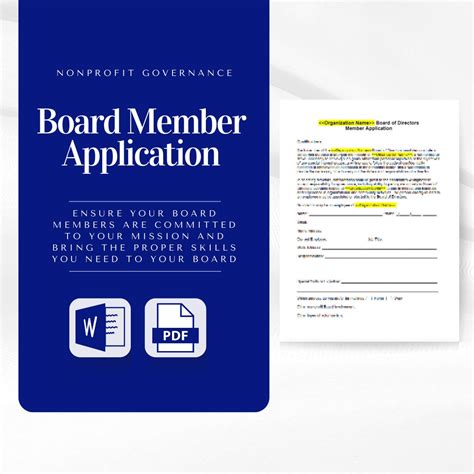Are you interested in taking your skills and experience to the next level by joining a board of directors? Becoming a board member can be a highly rewarding and challenging experience, but it requires a certain level of preparation and knowledge. In this article, we will explore the essentials of a board member application, including the skills and qualifications required, the application process, and tips for success.
The Role of a Board Member
A board member is a vital part of a company's governance structure, responsible for overseeing the organization's strategy, direction, and performance. Board members are responsible for making key decisions, providing guidance and oversight, and ensuring the company is operating in the best interests of its stakeholders. To be successful in this role, board members must possess a unique combination of skills, experience, and personal qualities.
Key Skills and Qualifications
To be considered for a board member position, you will typically need to possess the following skills and qualifications:
- Leadership experience: A proven track record of leadership and management experience, preferably in a similar industry or sector.
- Industry expertise: In-depth knowledge and understanding of the industry or sector in which the company operates.
- Strategic thinking: The ability to think critically and strategically, with a focus on long-term goals and objectives.
- Communication skills: Excellent communication and interpersonal skills, with the ability to work effectively with a wide range of stakeholders.
- Governance knowledge: A strong understanding of corporate governance principles and practices.
- Financial literacy: A basic understanding of financial management and accounting principles.

The Application Process
The application process for a board member position typically involves the following steps:
- Initial application: Submit your application, including your resume, cover letter, and any other required documentation.
- Screening: The company's nominating committee or governance team will review your application to determine whether you meet the minimum qualifications and requirements.
- Interviews: If your application is selected, you will be invited to participate in one or more interviews with the company's governance team or other stakeholders.
- Due diligence: The company will conduct a thorough background check and review your references to verify your credentials and experience.
- Appointment: If you are selected, you will be appointed to the board of directors and will begin your term as a board member.
Tips for Success
To increase your chances of success in the application process, consider the following tips:
- Network and build relationships: Building relationships with key stakeholders, including current board members, executives, and industry leaders, can help you stay informed about opportunities and get your foot in the door.
- Develop your skills and expertise: Continuously develop your skills and expertise, particularly in areas such as governance, finance, and strategy.
- Gain experience: Seek out opportunities to gain experience in governance and leadership roles, such as serving on non-profit boards or participating in industry organizations.
- Tailor your application: Customize your application to each opportunity, highlighting your relevant skills, experience, and qualifications.
- Prepare for interviews: Prepare thoroughly for interviews, researching the company and its governance structure, and practicing your responses to common interview questions.
Conclusion
Becoming a board member can be a highly rewarding and challenging experience, but it requires a certain level of preparation and knowledge. By understanding the essentials of a board member application, including the skills and qualifications required, the application process, and tips for success, you can increase your chances of success and take your career to the next level.
Benefits of Being a Board Member
Serving as a board member can bring numerous benefits, including:
- Personal and professional growth: Developing new skills and expertise, and expanding your professional network.
- Increased visibility and credibility: Enhancing your reputation and credibility within your industry or sector.
- Opportunities for networking: Building relationships with key stakeholders and industry leaders.
- Financial rewards: Receiving compensation and benefits for your service as a board member.
- Sense of purpose and fulfillment: Contributing to the success and growth of an organization, and making a positive impact on its stakeholders.

Challenges of Being a Board Member
While serving as a board member can be a highly rewarding experience, it also comes with its own set of challenges, including:
- Time commitment: Devoting a significant amount of time and energy to board meetings, committees, and other responsibilities.
- Liability and risk: Assuming personal liability and risk for the company's actions and decisions.
- Conflicts of interest: Managing potential conflicts of interest and maintaining independence and objectivity.
- Strategic decision-making: Making difficult and complex strategic decisions, often with limited information and resources.
- Stakeholder expectations: Managing the expectations and demands of various stakeholders, including shareholders, employees, and customers.

Gallery of Board Member Application Essentials






Frequently Asked Questions
What are the primary responsibilities of a board member?
+The primary responsibilities of a board member include overseeing the company's strategy, direction, and performance, as well as making key decisions and providing guidance and oversight.
What skills and qualifications are required to be a successful board member?
+To be a successful board member, you will typically need to possess a combination of skills and qualifications, including leadership experience, industry expertise, strategic thinking, communication skills, governance knowledge, and financial literacy.
How do I apply for a board member position?
+To apply for a board member position, you will typically need to submit your application, including your resume, cover letter, and any other required documentation, and then participate in one or more interviews with the company's governance team or other stakeholders.
